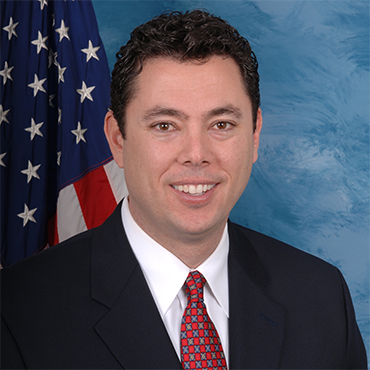Chaffetz seeks new tone on Oversight panel, but old disputes remain

The new chairman of the House Oversight and Government Reform Committee extends an olive branch to the minority, but keeps subpoena power for himself.

House Oversight and Government Reform Committee Chairman Jason Chaffetz (R-Utah)
Utah Republican Rep. Jason Chaffetz gaveled in the post-Darrell Issa era of the House Oversight and Government Reform Committee on Jan. 27, offering a rhetorical olive branch to the minority while adopting a rules package that the panel's top Democrat said was "worse than the rules we had under Chairman Issa."
The hearing room had been scrubbed of portraits of past committee leaders at the new chairman's request, in a pointed gesture designed to turn the page on the contentious leadership of Issa, a California Republican who now chairs the House Judiciary Intellectual Property Subcommittee.
"It is my hope that [ranking member] Mr. Cummings and I can work together to uncover ways to improve the way our government operates so we are maximizing every tax dollar that is spent," Chaffetz said of Maryland Democrat Elijah Cummings.
But Democrats were less than satisfied with the substance of the new chairman's agenda. And while Chaffetz -- who was Issa's point man during the panel's heated hearings on Benghazi -- sports an affable, media-friendly demeanor, he is hardly a shrinking violet, ensuring that the committee with jurisdiction over the federal workforce will continue to provide more than its share of controversy.
The Oversight panel has broad jurisdiction over government operations, and its mandate allows it to investigate basically whatever the chairman wants. Under Issa, this included probes into the attacks on U.S. diplomats in Benghazi, alleged bias against conservative groups shown by the IRS office charged with awarding tax-exempt status to non-profit organizations, and a Justice Department program to track illegal cross-border gun sales known as "Fast and Furious." In that last probe, a subpoena for documents issued by Issa to Attorney General Eric Holder was effectively ignored by the Obama administration, and the GOP-led House of Representatives responded by voting to hold Holder in contempt. Democratic members of the committee still seethe about the contempt vote, and Issa is a key flashpoint for their anger.
In his opening statement, Cummings unleashed a tirade against Issa's conduct as chairman. "The last four years were filled with acrimony, partisanship and sometimes vulgar displays," Cummings said. "They were a stain on this committee's integrity and an embarrassment to the House of Representatives."
If that weren't enough, any hope for a new era of good feeling were dampened by objections from committee Democrats about the new rules.
Democrats objected to a new measure eliminating the requirement that the ranking member consent to the extended questioning of witnesses -- questioning beyond the five-minute rule that applies to members in committee hearings, or for questioning by committee counsel or other accredited staff.
Additionally, Democrats sought, through an amendment offered by Rep. Gerry Connolly (D-Va.), to roll back the chairman's ability to subpoena witnesses or documents without obtaining the consent of the ranking member, or putting the subpoena request to a vote of the full committee. The amendment failed on a party-line vote, and no Democrats supported the new rules package.
Rep. William Lacy Clay (D-Mo.) said that Chaffetz was "doubling down on the Issa model," and that Republican leaders were "Issa-tizing the House."
This assessment is not far off from Issa's own read, although he naturally sees the development in a more positive light.
"Lots of committees are forming more aggressive [oversight and investigations] subcommittees, and have plans to do much of the work that we did," Issa told FCW. "Many of the talented people I was honored to work with have now been recruited by other committees who want to duplicate a lot of that. This cross-pollination is actually a very good thing."
Still, while Chaffetz is promising a more collegial tone on the committee, he clearly isn't planning on pulling back from the committee's traditional role as a watchdog of federal employees and programs. "We have wonderful federal employees that work hard," he said. "They're diligent. They're patriotic. From time to time there are problems, and those have to be addressed."
Chaffetz also formally announced the revival of the Information Technology Subcommittee. Led by freshman Rep. Will Hurd (R-Texas), the panel will focus on IT policy and procurement, emerging technologies, cybersecurity, information security management, telecommunications, and privacy. Rep. Robin Kelly (D-Ill.) was tapped as the ranking member.
Many IT issues will still go through the Subcommittee on Government Operations, led by Mark Meadows (R-N.C.), with Connolly as ranking member. Their portfolio includes government financial management and accounting, government management, procurement, public information and federal records.
NEXT STORY: 'Less RFPs and more APIs'



